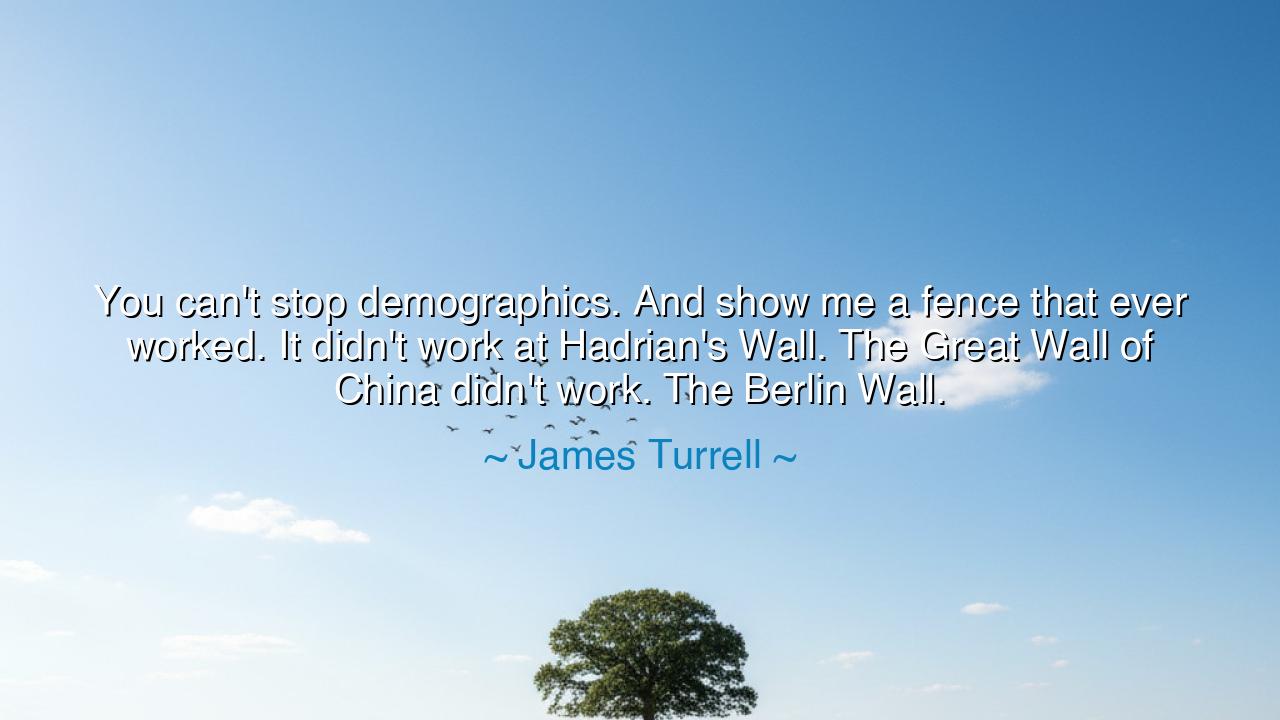
You can't stop demographics. And show me a fence that ever
You can't stop demographics. And show me a fence that ever worked. It didn't work at Hadrian's Wall. The Great Wall of China didn't work. The Berlin Wall.






“You can't stop demographics. And show me a fence that ever worked. It didn't work at Hadrian's Wall. The Great Wall of China didn't work. The Berlin Wall.” — James Turrell
When James Turrell, master of light and perception, spoke these words, he was not speaking merely of stone and metal, but of the futility of trying to wall off human destiny. His voice, calm yet thunderous in truth, reminds us that walls—no matter how high or strong—cannot contain the movement of peoples, ideas, or time itself. The forces of life, like rivers, find their way around every barrier. What Turrell declares is an ancient truth dressed in modern speech: that change cannot be confined, and that to resist the tides of history is to exhaust one’s strength fighting the inevitable.
The origin of this thought lies in Turrell’s reflections on human division, politics, and the flow of civilization. As an artist who works with the intangible—light, space, and perception—he sees beyond the physical into the spiritual. His reference to the walls of history is no accident. The Great Wall of China, built to guard against invaders, became less a barrier and more a monument to the persistence of human fear. Hadrian’s Wall, meant to shield the Roman Empire from the wild tribes of the north, soon fell to disuse as the empire itself crumbled. And the Berlin Wall, that grim symbol of ideological division, could not stand against the yearning of millions for freedom. In time, all these walls—no matter their purpose—were breached, bypassed, or torn down, because the spirit of humanity cannot be locked behind borders forever.
Turrell’s invocation of demographics is equally profound. He reminds us that populations are living tides, shaped by birth, migration, survival, and hope. They move not at the command of rulers or generals, but by the quiet power of life itself. Empires have risen believing they could dictate the shape of the human world, yet all have been humbled by the pulse of generations. Peoples displaced find new homes; cultures mingle and merge; identities evolve. To try to halt this process with walls is like trying to dam the ocean with bare hands. The movement of humanity is the oldest law of the Earth—older than kings, older than nations.
History, indeed, confirms this wisdom. Consider the Berlin Wall, raised in 1961 to divide East and West, to imprison ideas as much as people. For nearly three decades it stood as a scar across a city, a testament to human arrogance—the belief that concrete could silence the heart’s longing for unity. Yet on a single night in 1989, it fell, not to armies but to the will of ordinary people, who gathered, sang, and climbed until the wall was no more. The world watched, and learned again that walls crumble when hearts rise. That night was the triumph of humanity over division, of time over tyranny.
Even the Great Wall of China, that marvel of ancient engineering, could not seal a civilization from change. The tribes it was meant to keep out eventually became part of the empire it guarded. Trade, culture, and blood flowed across it until the wall became less a barrier than a bridge of memory. Hadrian’s Wall, too, fell silent as Rome’s reach receded. In time, the very stones once raised in fear were repurposed to build the homes of those once called “barbarians.” Thus, the walls meant to divide ended up binding history together, proving that separation is temporary, but connection eternal.
Turrell’s message, then, is not only political but spiritual. He speaks of the blindness that comes when fear builds fences between people. To wall ourselves off from others—through prejudice, isolation, or pride—is to resist the natural order of the world. Light, his chosen medium, passes freely through barriers, reflecting, refracting, illuminating. So too should the human heart. For light and life share one truth: they move forward. They cannot be imprisoned without dimming the world.
The lesson here is timeless. Do not build walls—build understanding. Do not seek to halt what you fear; seek instead to learn from it, to grow with it. Whether between nations or within souls, division breeds decay, but connection brings renewal. The wise do not fight the tide; they learn to sail upon it. The artist, the philosopher, the leader—all must learn this truth: that humanity’s strength lies not in separation, but in unity.
So, remember, O listener of the ages: no wall endures forever. Empires crumble, and boundaries blur, but the human spirit endures, seeking light, warmth, and belonging. As Turrell reminds us, you cannot stop demographics—for they are not numbers, but lives, dreams, and the unending rhythm of creation. To live wisely is not to build fences, but to open doors—to let the light in, and to let humanity, in all its wandering beauty, pass through.






AAdministratorAdministrator
Welcome, honored guests. Please leave a comment, we will respond soon